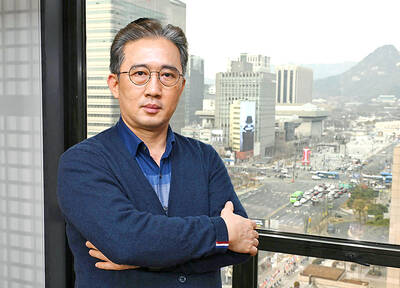The suicide bombers who have killed 10,000 people in Iraq, including hundreds of US troops, are usually alienated young men from large families who are desperate to stand out from the crowd and make their mark -- and they are not Iraqi -- a US military study found.
As long suspected, most come from abroad. Saudi Arabia, home of most of the hijackers involved in the Sept. 11,2001, attacks in the US, is the single largest source. And the pipeline is continually replenished by recruiters for al-Qaeda in Iraq.
The study, obtained by The Associated Press, profiles the suicide bombers and their support system based in part on interrogations of 48 foreign fighters who were captured or surrendered. The US command is trying to understand the system, including al-Qaeda in Iraq's recruiting, training and transportation network, so it can be disrupted before the bombers strike.

PHOTO: AFP
The report summary said interrogators concluded that most foreign fighters are Sunni Muslim men aged 18 to 30, with a mean age of 22. They are almost always single males with no children and tend to be students or hold blue-collar jobs ranging from taxi drivers to construction and retail sales.
The summary went on to describe the majority of the fighters as having six to 12 years of schooling, with very few having gone to college. Most come from families in the poor or middle classes and have six to eight siblings.
"In these large family groups, individuals seek ways to `make their mark,' to set them apart. In many ways, entering jihad gives sons a way to show themselves unique in a large family," the summary said.
Tallies from the National Counterterrorism Center in Washington showed that 949 suicide bombers killed 10,119 people and wounded 22,995 from the beginning of 2004 until now. Data compiled by the AP through its own reporting found that between April 28, 2005, and last week there were 708 incidents involving suicide bombings, with a total of 14,633 Iraqis wounded and 7,098 killed.
Author Mohammed Hafez, who has tracked data in his own separate study, Suicide Bombers in Iraq, said there have been 1,800 suicide attacks worldwide since the phenomenon began in the early 1980s. Of those, more than half have taken place in Iraq.
"There have been more than 900 suicide attacks in Iraq ... Certainly the phenomenon is growing," said Hafez, a political science professor at the University of Missouri, Kansas City.
US Rear Admiral Gregory Smith, the spokesman for Multinational Forces in Iraq, said the overwhelming majority of suicide attackers in Iraq are not Iraqi.
"Iraqis are religiously and socially opposed to suicide, requiring al-Qaeda to recruit foreigners to carry out their terror. Approximately 90 percent of the suicide attacks in Iraq are carried out by foreigners," he said.
In an interview, two senior analysts who helped question the 48 captured fighters said the picture that emerges is of a cold and calculating process that recruits young, alienated men who are social outcasts. The interrogators could not be named for security reasons.
The demand for many foreign fighters begins in places such as the dingy back streets of teeming Iraqi cities such as Mosul, where al-Qaeda still holds sway.
If an al-Qaeda cell decides it needs two suicide bombers, it puts in an order.
That request goes to Syria and to the facilitators and recruiters training young men in North Africa and Saudi Arabia.
Three months later, the bomber is delivered, military investigators and officials say.
The US military said records seized from al-Qaeda show that 40 percent come from North African countries such as Libya and Algeria and 41 percent from Saudi Arabia.

VAGUE: The criteria of the amnesty remain unclear, but it would cover political violence from 1999 to today, and those convicted of murder or drug trafficking would not qualify Venezuelan Acting President Delcy Rodriguez on Friday announced an amnesty bill that could lead to the release of hundreds of prisoners, including opposition leaders, journalists and human rights activists detained for political reasons. The measure had long been sought by the US-backed opposition. It is the latest concession Rodriguez has made since taking the reins of the country on Jan. 3 after the brazen seizure of then-Venezuelan president Nicolas Maduro. Rodriguez told a gathering of justices, magistrates, ministers, military brass and other government leaders that the ruling party-controlled Venezuelan National Assembly would take up the bill with urgency. Rodriguez also announced the shutdown

Chinese President Xi Jinping’s (習近平) purge of his most senior general is driven by his effort to both secure “total control” of his military and root out corruption, US Ambassador to China David Perdue said told Bloomberg Television yesterday. The probe into Zhang Youxia (張又俠), Xi’s second-in-command, announced over the weekend, is a “major development,” Perdue said, citing the family connections the vice chair of China’s apex military commission has with Xi. Chinese authorities said Zhang was being investigated for suspected serious discipline and law violations, without disclosing further details. “I take him at his word that there’s a corruption effort under

China executed 11 people linked to Myanmar criminal gangs, including “key members” of telecom scam operations, state media reported yesterday, as Beijing toughens its response to the sprawling, transnational industry. Fraud compounds where scammers lure Internet users into fake romantic relationships and cryptocurrency investments have flourished across Southeast Asia, including in Myanmar. Initially largely targeting Chinese speakers, the criminal groups behind the compounds have expanded operations into multiple languages to steal from victims around the world. Those conducting the scams are sometimes willing con artists, and other times trafficked foreign nationals forced to work. In the past few years, Beijing has stepped up cooperation

The dramatic US operation that deposed Venezuelan president Nicolas Maduro this month might have left North Korean leader Kim Jong-un feeling he was also vulnerable to “decapitation,” a former Pyongyang envoy to Havana said. Lee Il-kyu — who served as Pyongyang’s political counselor in Cuba from 2019 until 2023 — said that Washington’s lightning extraction in Caracas was a worst-case scenario for his former boss. “Kim must have felt that a so-called decapitation operation is actually possible,” said Lee, who now works for a state-backed think tank in Seoul. North Korea’s leadership has long accused Washington of seeking to remove it from power